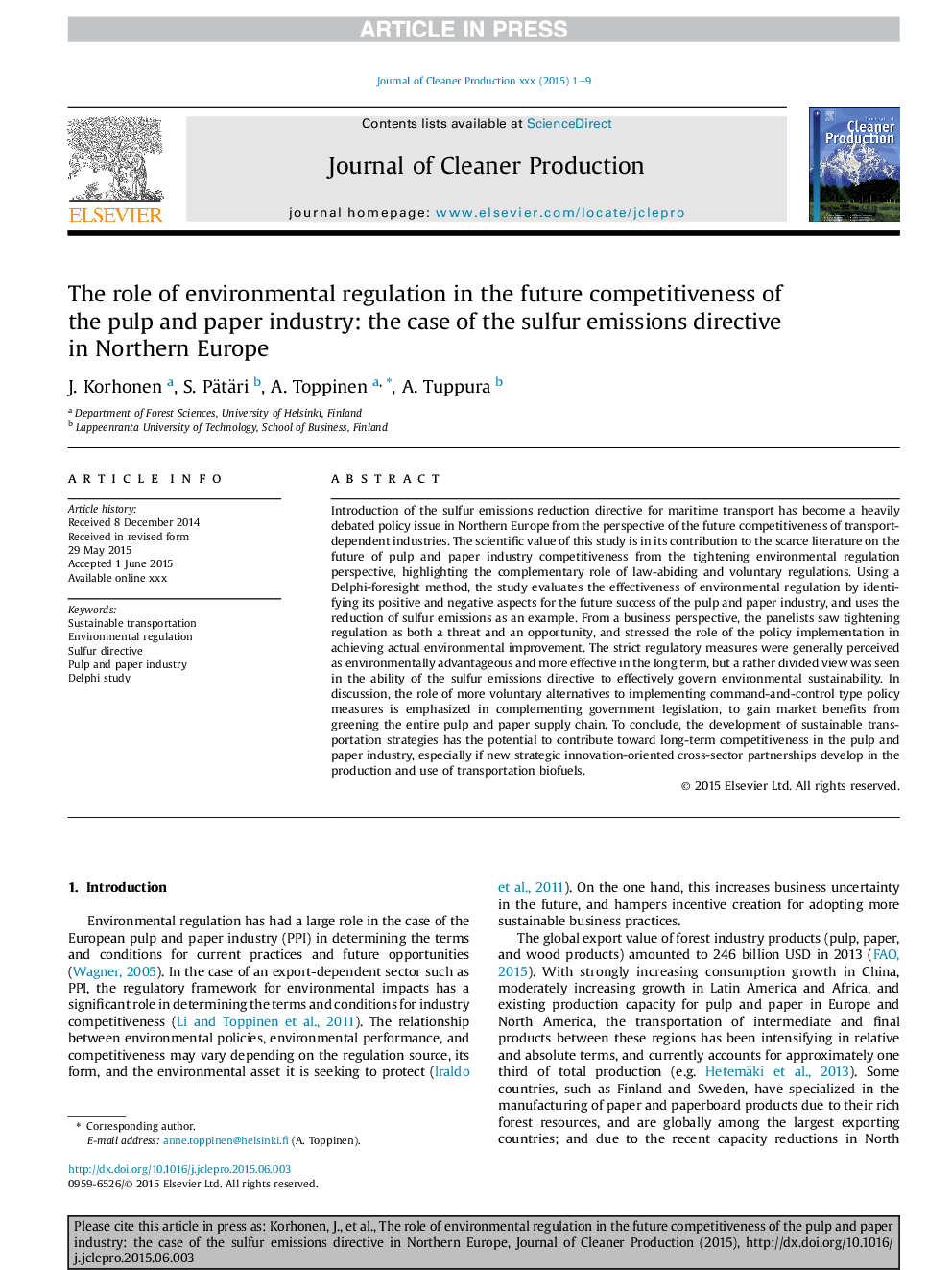| کد مقاله | کد نشریه | سال انتشار | مقاله انگلیسی | نسخه تمام متن |
|---|---|---|---|---|
| 10688215 | 1017980 | 2015 | 9 صفحه PDF | دانلود رایگان |
عنوان انگلیسی مقاله ISI
The role of environmental regulation in the future competitiveness of the pulp and paper industry: the case of the sulfur emissions directive in Northern Europe
ترجمه فارسی عنوان
نقش مقررات زیست محیطی در رقابت پذیری آینده صنایع کاغذ و پالپ: در مورد دستورالعمل انتشار گاز گوگرد در شمال اروپا
دانلود مقاله + سفارش ترجمه
دانلود مقاله ISI انگلیسی
رایگان برای ایرانیان
کلمات کلیدی
حمل و نقل پایدار، مقررات محیطی، دستورالعمل گوگرد صنعت کاغذ و کاغذ مطالعه دلفی،
ترجمه چکیده
معرفی دستورالعمل کاهش گاز گوگرد برای حمل و نقل دریایی تبدیل شده است به یک مسئله سیاست بحث و جدل در شمال اروپا از نظر رقابت در آینده از صنایع وابسته به حمل و نقل است. ارزش علمی این مطالعه در سهم خود در ادبیات ضعیف در مورد آینده رقابت صنایع کاغذ و پالایش از منظر مقررات زیست محیطی است که نقش ممتاز مقررات قانونی و داوطلبانه را برجسته می کند. با استفاده از روش دلفی پیش بینی، مطالعه اثربخشی تنظیم مقررات زیست محیطی را با شناسایی جنبه های مثبت و منفی آن برای موفقیت آتی صنایع کاغذ و کاغذ، و از کاهش انتشار گوگرد به عنوان مثال استفاده می کند. از منظر تجاری، هیئت مدیره، مقررات سختگیرانه را به عنوان یک تهدید و یک فرصت دید، و بر نقش اجرای سیاست در دستیابی به بهبود واقعی محیط زیست تأکید داشت. اقدامات نظارتی سختگیرانه به طور کلی به عنوان محیط زیست سودمند و موثر در دراز مدت در نظر گرفته شد، اما دیدگاه نسبتا مختصر در توانایی دستورالعمل انتشار گاز گوگرد به طور موثر پایدار بودن محیط زیست را مد نظر قرار داد. در بحث، نقش جایگزین های داوطلبانه بیشتری برای اجرای تدابیر سیاست های کنترل فرمان و کنترل در تکمیل قوانین دولتی، برای به دست آوردن مزایای بازار از سبز کردن کل زنجیره تامین کاغذ و کاغذ تأکید شده است. به این ترتیب توسعه استراتژی های حمل و نقل پایدار بالقوه است که به رقابت در درازمدت در صنعت کاغذ و صنایع کاغذ کمک می کند، به ویژه اگر همکاری های متقابل بخش های نوین استراتژیک جدید در تولید و استفاده از سوخت های زیستی حمل و نقل توسعه یابد.
موضوعات مرتبط
مهندسی و علوم پایه
مهندسی انرژی
انرژی های تجدید پذیر، توسعه پایدار و محیط زیست
چکیده انگلیسی
Introduction of the sulfur emissions reduction directive for maritime transport has become a heavily debated policy issue in Northern Europe from the perspective of the future competitiveness of transport-dependent industries. The scientific value of this study is in its contribution to the scarce literature on the future of pulp and paper industry competitiveness from the tightening environmental regulation perspective, highlighting the complementary role of law-abiding and voluntary regulations. Using a Delphi-foresight method, the study evaluates the effectiveness of environmental regulation by identifying its positive and negative aspects for the future success of the pulp and paper industry, and uses the reduction of sulfur emissions as an example. From a business perspective, the panelists saw tightening regulation as both a threat and an opportunity, and stressed the role of the policy implementation in achieving actual environmental improvement. The strict regulatory measures were generally perceived as environmentally advantageous and more effective in the long term, but a rather divided view was seen in the ability of the sulfur emissions directive to effectively govern environmental sustainability. In discussion, the role of more voluntary alternatives to implementing command-and-control type policy measures is emphasized in complementing government legislation, to gain market benefits from greening the entire pulp and paper supply chain. To conclude, the development of sustainable transportation strategies has the potential to contribute toward long-term competitiveness in the pulp and paper industry, especially if new strategic innovation-oriented cross-sector partnerships develop in the production and use of transportation biofuels.
ناشر
Database: Elsevier - ScienceDirect (ساینس دایرکت)
Journal: Journal of Cleaner Production - Volume 108, Part A, 1 December 2015, Pages 864-872
Journal: Journal of Cleaner Production - Volume 108, Part A, 1 December 2015, Pages 864-872
نویسندگان
J. Korhonen, S. Pätäri, A. Toppinen, A. Tuppura,
